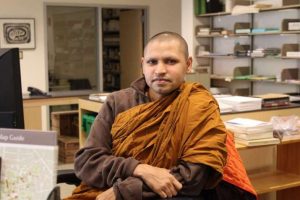Tulku, a film by Gesar Mukpo, examines the tulku system and its application to people recognized as tulkus in the West. Tulku is Tibetan for manifestation and refers to a system of reincarnation where high lamas choose to reincarnate to continue the spread of the Dharma. Tulkus are recognized upon their return by other high lamas.
This documentary, by a person himself identified as a tulku (Gesar Mukpo) is about several westerners identified as tulku by prominent Tibetan masters who were then raised in the West without the traditional Tibetan monastic upbringing. The movie explores what it means to be tulku under these circumstances and discusses how these Westerners identified as tulkus feel about their role and obligations to this ancient practice. The documentary discusses the tulku situation with the following Westerners identified as tulkus: Gesar Mukpo, Dylan Henderson, Ashoka Mukpo, Wyatt Arnold and Ruben Adrian Derksen.
Gesar Mukpo examines some of the important questions concerning the tulku system and attempts to answer them:
- – Why does the tulku system exist?
- – What is the tulku system’s role in Tibetan Buddhism?
- – Why are there tulkus being recognized in the West?
- – If you tell someone that they are a tulku, what are they supposed to do?
- – Is the monastic upbringing necessary for the development of a tulku?
- – Can a tulku be brought up in the West and still be a tulku?
- – Is there an obligation of the tulku?
- – How is the tulku supposed to fulfill this obligation if he is just an ordinary person?
- – What is the future of the tulku system?
- – Should the tulku system continue in the West?
The documentary is an insightful look into the tulku system from a uniquely Western perspective. In each of the tulkus profiled, the Tibetan master believed the Westerner was the manifestation of a previous master, even if the Westerner or their families did not believe. In the end, Gesar Mukpo comes to the conclusion a person will find their own way and that being a tulku or not doesn’t really matter.
I viewed this documentary from the perspective of both a Westerner and a Buddhist. I learned a little bit more about the tulku system and a lot more about the recognition of tulkus in the West. Finding tulkus in the West is encouraging because it shows that the Dharma is spreading and that Tibetan Buddhism is not only for Tibetans. Tulkus manifest for the benefit of all sentient beings and their reincarnations occur wherever it does the most benefit. In my opinion, the West is in need of this type of help.
This documentary, while specifically being about the tulku system, also talked about the need of being true to oneself and following one’s own path. Gesar Mukpo says in the film, “Without looking back we can never move forward. But without moving forward we are simply stuck in the past.” It is important to recognize the past, but to live in the present and deal with things as they are is the most important thing. Buddhism transcends culture and tradition, and Western cynicism and objectivity can be good for Buddhism. To me, the underlying message of the film is that no matter whether a person is a tulku or not, their karma is their karma and a person can still be a benefit to others and that is what being a Buddhist is all about.
http://www.nfb.ca/film/tulku_trailer/embed/player
Additional reading on new tulku in America: “Minnesota preschooler anointed as reincarnated spiritual guru” http://www.takshamtulku.com/
















